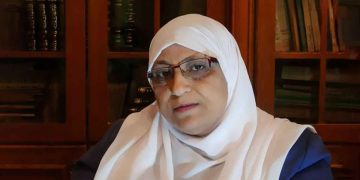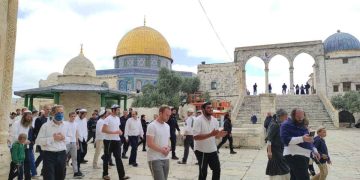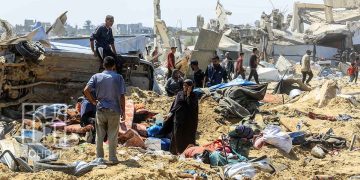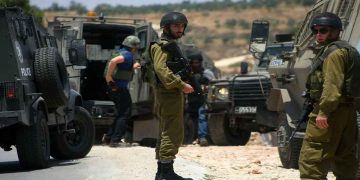Arab Organisation for Human Rights in the UK (AOHR UK) held a webinar on Monday, July 8, 2024, to address the escalating famine and genocide crisis in Gaza. The event featured prominent speakers from various backgrounds, including academics, journalists, and activists, who shared their insights on the humanitarian issues and human rights violations occurring in Gaza. The webinar aimed to highlight the severe impact of the ongoing genocide and the urgent need for international solidarity and action to support the Palestinian people.
The webinar featured a distinguished panel of speakers, including Prof Stephen Zunes– Professor of International Security and Foreign Policy at the University of San Francisco, Nabil Al-Khoury – American academic and diplomat, Colin Cooper– Member of Scottish Friends of Palestine, Steve Sosebee– Founder of HEAL Palestine, Olivia Zémor – French journalist and human rights activist, Booker Ngesa Omole – Kenyan Political Activist, and Sonja van den Ende – Dutch Journalist and political activist
Prof. Stephen Zunes opened his speech by highlighting the significant role of the United States in facilitating Israel’s actions in Gaza. He argued that Israel’s ongoing atrocities are enabled by the U.S., which provides military aid, diplomatic cover through UN vetoes, and legal protection by undermining international legal bodies like the International Criminal Court (ICC). According to Zunes, this support violates several U.S. laws, including the 1961 Arms Export Control Act and the 1990 Leahy laws, as well as President Biden’s own National Security Memorandum. He emphasised that U.S. policy is not just immoral and illegal but also deeply entrenched in a history of supporting genocidal wars.
Zunes underscored the broader implications of U.S. imperialism, comparing the situation in Gaza to past U.S.-supported genocides in places like Bangladesh, Guatemala, and East Timor. He stressed that the issue is not solely about the pro-Israel lobby but a larger pattern of U.S. imperialism that supports oppressive regimes. Despite these bleak circumstances, Zunes found hope in the changing U.S. public opinion, particularly among the younger generation. He noted that large majorities of Americans now support a permanent ceasefire and an end to U.S. military aid to Israel, marking a significant shift in public sentiment.
This shift, according to Zunes, is forcing some changes in U.S. policy, albeit limited and inconsistent. He pointed out that millions of Americans, including many American Jews, are protesting U.S. policies and calling for justice in Palestine. These protests, the largest in decades, have led to some policy adjustments, although they fall short of the necessary comprehensive change. Zunes concluded by emphasising the growing political liability of supporting Israel among U.S. politicians, predicting that the pro-Palestinian, anti-Zionist stance of the younger generation will shape future U.S. policies.
Sonja van den Ende provided a grim overview of the humanitarian crisis in Gaza, detailing the severe food shortages and widespread starvation caused by the Israeli blockade and bombings. She reported that nearly 69% of Gaza’s population faces severe food shortages, with over 495,000 people, including many children, at risk of starvation and disease. The relentless Israeli attacks since October 7th have resulted in approximately 38,000 Palestinian deaths, a figure that likely underestimates the true toll as many bodies remain buried under rubble.
Van den Ende condemned the complicity of Western countries, particularly the U.S. and European Union, in supporting Israel’s genocidal actions. She criticised the Netherlands for continuing to produce and supply fighter jet parts used by Israel, despite a Dutch court’s condemnation. She lamented the hypocrisy of Europe, which pledged “never again” after World War II but now supports a genocide. Highlighting the live broadcast of this genocide on social media, van den Ende pointed out the radicalisation in Western societies, driven by Zionist ideologies that dehumanise Arabs and Muslims.
Van den Ende emphasised that the Israeli regime’s objectives are clear: to continue bombing Gaza and massacre its people. She called for unity among the Arab world to resist and defeat the Israeli regime, stressing that the solution will not come from the West. She mentioned the ICC’s issuance of arrest warrants for Israeli leaders, although recognizing that Israel’s non-recognition of the court makes enforcement unlikely.
Colin Cooper discussed the disconnect between the UK establishment and activists supporting Palestine. He highlighted a recent incident in Scotland where the UK Prime Minister avoided facing protesters holding Palestinian flags. Cooper noted that the UK has a deeply entrenched form of racism. He emphasised the need for education about historical events like the Balfour Declaration and Nakba to combat this ignorance and promote understanding.
Cooper argued that compassion fatigue is becoming a significant issue, with fewer people attending weekly demonstrations. He stressed the importance of leveraging Scotland’s strong tradition in education and medicine to support Gaza, suggesting that civil society must be more actively involved. Cooper also criticised the lack of support from the church and government, which are influenced by a powerful pro-Israel lobby. He called for a focus on preserving Palestinian culture and rebuilding Gaza, drawing parallels with the Khmer Rouge’s destruction of Cambodian culture and the subsequent efforts to restore it.
He further compared the Israeli government to apartheid South Africa, using Bishop Tutu’s words to emphasise the need for international pressure to isolate and delegitimize Israel. Cooper concluded by calling for courage to look beyond the immediate devastation and plan for a future where Palestinian children can live normal, healthy lives.
## Booker Ngesa Omole – Kenyan Political Activist
Booker Ngesa Omole expressed solidarity with the Palestinian people, asserting that victory can only be achieved through resistance. He criticised the Palestinian Authority for attempting to negotiate with Israel, arguing that negotiation with an imperialist power is futile. Omole emphasised that the U.S. support for the genocide in Gaza is driven by interests rather than principles, highlighting the hypocrisy of delivering food aid while simultaneously blocking essential supplies and supporting military actions.
Omole drew parallels between the Palestinian struggle and African resistance against colonialism, particularly the fight against apartheid in South Africa. He noted that the intensification of bombing in Gaza is intended to instill fear and hopelessness, but history has shown that even powerful armies can be defeated through determined resistance. Omole condemned the Zionist use of Christian rhetoric to justify land theft and murder, criticizing Western media for framing the genocide in a biased manner that blames the victims.
He argued that the two-state solution is a false hope and called for a single democratic state where all people, including Jews and Arabs, can coexist peacefully. Omole stressed the importance of international solidarity and the need to intensify efforts against U.S. imperialism and its allies. He concluded by highlighting the growing support for Palestine in Kenya and other parts of the global South, expressing confidence in the eventual victory of the Palestinian people.
Olivia Zémor, president of Europalestine, spoke about the severe repression of pro-Palestinian activism in France. She highlighted the French government’s ban on demonstrations against Israeli bombings, which lasted for several weeks, accompanied by fines and arrests. Despite this, activists continued to protest, using social media to circulate their actions widely. Zémor criticised the mainstream media in France for its silence on Gaza, noting that unlike other Western countries, French media largely ignores the crisis.
Zémor described creative ways her organization raises awareness about the genocide in Gaza, such as organizing street shows and demonstrations with posters depicting starving children. They also disrupt public spaces, like the French foreign affairs ministry’s restaurant, to force people to confront the reality of the situation. Zémor emphasised the importance of combining activism with cultural activities, such as singing and dancing, to maintain morale and attract more supporters.
She also discussed the economic impact of boycotting Israeli products and companies that support Israel, highlighting the success of these efforts in France. Zémor questioned the U.S. political landscape, wondering if there were alternatives to Biden and Trump that could bring about change. She concluded by stressing the need for ongoing, determined activism and the importance of integrating cultural elements to keep the movement energized and engaged.
Steve Sosebee shared his journey from a student activist during the First Intifada to founding the Palestine Children’s Relief Fund (PCRF) and later HEAL Palestine. He emphasised his commitment to the Palestinian cause and the resilience of the Palestinian people. Sosebee focused on the humanitarian aspect of his work, particularly bringing injured Palestinian children to the U.S. for medical care, and how this effort helped raise awareness among Americans about the realities in Gaza.
Sosebee highlighted the urgent need for immediate humanitarian aid in Gaza, given the ongoing genocide. HEAL Palestine, his new organisation, aims to provide not only medical care but also mental health support and vocational training to help Palestinian children rebuild their lives. He stressed the importance of showing solidarity and support for Palestinian children, who often feel undervalued by the international community.
Sosebee discussed the broader goals of HEAL Palestine, which include empowering the Palestinian diaspora to support their community and building a new generation of leaders in Gaza. He highlighted the challenges faced by injured children who are denied travel permits by Israel, emphasising the need for persistent advocacy and support. Sosebee concluded by expressing hope that the genocide will end soon and reaffirmed his commitment to continue supporting the Palestinian cause through practical, impactful actions.
Sosebee’s narrative underscored the critical role of community involvement and international solidarity in addressing the humanitarian crisis in Gaza. He called for a focus on long-term healing and rebuilding, not just immediate relief, to ensure that Palestinian children can have a future beyond the current genocide. His work aims to inspire hope and resilience among Palestinians and their supporters worldwide.
Nabil Al-Khoury provided a sobering analysis of the situation in Gaza, drawing parallels to historical atrocities such as those committed by Nazi Germany and the Vikings. He expressed deep frustration at the world’s inability to stop the ongoing genocide, criticising both Israeli and U.S. leaders. Al-Khoury acknowledged the heroic efforts of humanitarian organisations and civil society activists but doubted their ability to end the war without significant political change.
Al-Khoury outlined several potential scenarios for change, including a radical shift in Israeli politics or a change in U.S. leadership. However, he was pessimistic about these prospects, given the entrenched power of the pro-Israel lobby and the lack of a viable alternative to Biden and Trump in the U.S. He mentioned the progressive members of Congress as a potential source of change but recognised their limited influence in the current political climate.
He concluded by stating that a forceful military response from the axis of resistance might be the only way to pressure Israel to end its genocidal actions. Al-Khoury warned that this would lead to further violence and suffering but saw no other realistic path to achieving justice for the Palestinian people. His analysis underscored the dire situation and the urgent need for a strong, unified response to the ongoing genocide in Gaza.





























